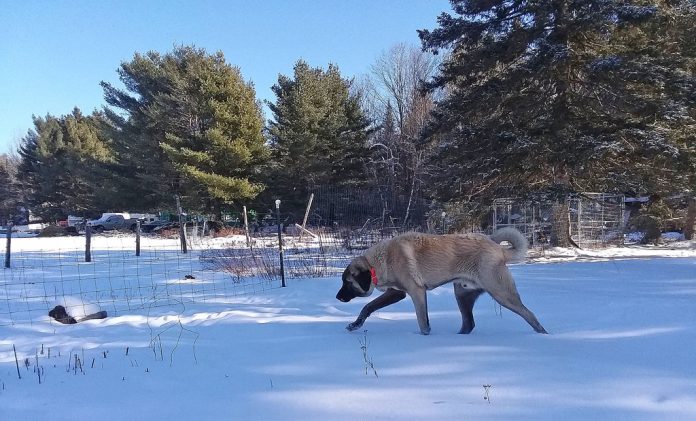
We are smack dab in the middle of winter here, a lull in the cycle of farm life. It’s too cold to do much in the way of property maintenance or improvement and not late enough to start prepping for spring. It’s a good time to reflect, evaluate, train and improve.
Meet Farei Kennels’ HR Fitz. He is not only the youngest member of our livestock guardian dog working crew — he is the potential future of our program.
At 11 months old, his obedience training is almost complete, including recall with distractions. We will continue to polish and maintain through daily interactions but for now, that school is over. Fitz is long past potty training and house manners. He’s learned to ride in the truck and behave himself in public. His days of holding Mom’s hand to cross the street have passed, and it’s time for the next stage in his training to begin.
Guarding birds
Using poultry as a large part of our pest management efforts has its benefits and challenges. We have found birds don’t rotate well on their own. They do best when they remain in their home territory throughout their lives, raising their young and teaching them to forage and survive, within that territory.
This means that they must be guarded even when the stock are grazing in another area, with their own guardians, of course. We run two types of guardians: territory guardians and flock guardians. This presents a unique challenge. Our “packs” are always changing. Our guardians must be flexible enough to work with multiple members of our team on a random basis, as well as comfortable moving through territories, as we rotate stock.
Fitz’s next step
We have three pasture grazing areas and three wooded forage areas. Beginning last month, Fitz moved from the yard and night corrals, down to our furthest grazing area to work with his great-grandfather.
We use tethering as a tool to introduce youngsters to new areas, as well as new stock or new situations, such as lambing. We like to give our young dogs a chance to observe and learn without the possibility of failure. An ounce of prevention is worth a pound of cure, after all.
He is learning to guard free-range chickens and rabbits, as well as one aging pot bellied pig. He is learning to patrol his new area, and discerning what threats are present and what’s normal.
Preparation
This adjustment period during our lull is crucial. Owls hatch their young in February and will be hunting more determinedly. Lambing comes just as our predator load starts to feel the strain of winter’s hardship, followed by kidding season, when the eagles show up.
This is one of the times of year where our guardian dogs earn their keep. We have had eagles try to take lambs right out of the pasture, and as winter drags on, the owls start hunting in broad daylight, keeping the dogs and stock on their toes day and night.
We also have issues with the occasional bear here. Often times, they are more attracted to the poultry feeding stations. But they can be opportunistic.
We lost a young male guardian dog to a boar two years ago, and we’ve added dogs to ensure no one works alone, especially in the spring.
Adaptability
Fitz is already used to poultry and has spent time with all of our hooved stock, while working with his grandmother throughout the summer. He’s familiar with the foxes, fisher cats and raccoons that plague the more wooded areas closer to the house.
Now, he will learn about aerial predators, the coyote packs that inhabit the neighboring wildlife sanctuary and the vulnerable springtime babies. By the time he is mature, he will be comfortable guarding any area we have and no matter which stock he’s tasked to protect.
He will guard — because it is important to us, because we care, and in doing so, we have taught him to care. Be it a baby chick, rabbit kit or a calf.
I am the shepherd. I am the line.









